6 aug 2014
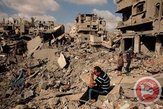
10 bodies were removed from the rubble across the Gaza Strip on Wednesday, as locals took advantage of the second day of calm in the 72-hour ceasefire to assess the damage caused by more than a month of relentless Israeli assault.
Medical sources said that 10 bodies were found as medical teams were able to gain access to ruins previously off-limits by Israel, which imposed a "buffer zone" over 44 percent of the Gaza Strip during the assault. Previously the zone encompassed 17 percent of the Strip.
Sources at the Gaza Strip's largest hospital al-Shifa said that five of the bodies were pulled out from under the rubble of homes in the Abu Halawa area of Rafah in the southern Gaza Strip, and had yet to be identified.
The bodies bring the total in Israel's four-week assault to at least 1,885, of whom at least 430 were children and 79 were elderly.
The Ministry of Health estimates that 9,567 people were also wounded in the assault, including 2,878 children and 374 elderly.
The United Nations' children protection agency UNICEF said on Tuesday that nearly 400,000 children were suffering from post-traumatic stress disorder, stressing that although they were committed to help the situation appeared "extraordinarily bleak."
"If you were seven years old, you would have lived two previous wars and the latest escalation is worse than the 2008-2009 and 2012 aggression," head of the Gaza field office Pernille Ironside said in a press conference.
"How do we expect parents and caregivers to care for their children and to raise them in a positive and nurturing way when they themselves are barely functioning as humans? People have lost entire strands of their family in one blow," she added in statements made to the UN in Geneva.
"How can a society cope with this? This is a deep, deep, deep wound."
Medical sources said that 10 bodies were found as medical teams were able to gain access to ruins previously off-limits by Israel, which imposed a "buffer zone" over 44 percent of the Gaza Strip during the assault. Previously the zone encompassed 17 percent of the Strip.
Sources at the Gaza Strip's largest hospital al-Shifa said that five of the bodies were pulled out from under the rubble of homes in the Abu Halawa area of Rafah in the southern Gaza Strip, and had yet to be identified.
The bodies bring the total in Israel's four-week assault to at least 1,885, of whom at least 430 were children and 79 were elderly.
The Ministry of Health estimates that 9,567 people were also wounded in the assault, including 2,878 children and 374 elderly.
The United Nations' children protection agency UNICEF said on Tuesday that nearly 400,000 children were suffering from post-traumatic stress disorder, stressing that although they were committed to help the situation appeared "extraordinarily bleak."
"If you were seven years old, you would have lived two previous wars and the latest escalation is worse than the 2008-2009 and 2012 aggression," head of the Gaza field office Pernille Ironside said in a press conference.
"How do we expect parents and caregivers to care for their children and to raise them in a positive and nurturing way when they themselves are barely functioning as humans? People have lost entire strands of their family in one blow," she added in statements made to the UN in Geneva.
"How can a society cope with this? This is a deep, deep, deep wound."
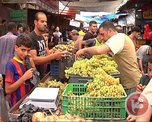
Palestinians return to markets in Gaza to stock up on goods on Wednesday
Despite the challenges ahead, most Gazans on Wednesday were focused on taking advantage of the respite from the violence and returning to normal life, at least for now.
Thousands of the 485,000 people mandated to evacuate from their homes by Israel during its ground assault continued to stream home for a second day, although with PLO figures indicating that nearly 6,000 structures have been completely demolished and 32,150 homes damaged, many were returning to find devastation in place of their former lives.
Ramadan Abu Khusa, a Gaza resident who returned to find himself newly homeless, told Ma'an that he had set up a tent on the rubble of his house "to guard what is left of it."
"When we came back, we found our houses destroyed. They turned it into rubble."
Abu Khusa, who fled his house with 15 family members, said that some 70 houses belonging to his extended family had been completely destroyed across the northern Gaza Strip, which bore the brunt of the Israeli ground assault.
"When we fled, we did not take anything with us, not even clothes or money. We did not expect all this wreckage to happen," Abu Khusa said, adding that they only took white flags to walk with as they fled.
Abu Khusa said that the area was completely unrecognizable by the time they returned.
In central Gaza City, meanwhile, shops re-opened their doors, markets flooded with shoppers, and taxis returned to the streets.
Although shopkeepers had to stay shut during the usually busy Eid al-Fitr shopping season in mid-July, many opened again as shoppers swarmed local markets to stock up ahead of an uncertain future following the end of the ceasefire Friday morning.
Despite the return of a certain level of normalcy in the streets, it was clear that the damage suffered by Gazan infrastructure would take many years to repair.
Electricity supply on Wednesday reached two to three hours a day in most areas, after falling to zero hours a day in much of the Gaza Strip after Israeli bombed Gaza's sole power plant on July 29.
The Gaza power authority said at the time that the damage would take at least a year to repair in order to bring Gaza back up to its previous daily electricity average of around eight hours.
Sirens heard in Sdot Negev
Rocket sirens were heard in Sdot Negev in southern Israel on Wednesday but were later said to have been a false alarm.
Despite the challenges ahead, most Gazans on Wednesday were focused on taking advantage of the respite from the violence and returning to normal life, at least for now.
Thousands of the 485,000 people mandated to evacuate from their homes by Israel during its ground assault continued to stream home for a second day, although with PLO figures indicating that nearly 6,000 structures have been completely demolished and 32,150 homes damaged, many were returning to find devastation in place of their former lives.
Ramadan Abu Khusa, a Gaza resident who returned to find himself newly homeless, told Ma'an that he had set up a tent on the rubble of his house "to guard what is left of it."
"When we came back, we found our houses destroyed. They turned it into rubble."
Abu Khusa, who fled his house with 15 family members, said that some 70 houses belonging to his extended family had been completely destroyed across the northern Gaza Strip, which bore the brunt of the Israeli ground assault.
"When we fled, we did not take anything with us, not even clothes or money. We did not expect all this wreckage to happen," Abu Khusa said, adding that they only took white flags to walk with as they fled.
Abu Khusa said that the area was completely unrecognizable by the time they returned.
In central Gaza City, meanwhile, shops re-opened their doors, markets flooded with shoppers, and taxis returned to the streets.
Although shopkeepers had to stay shut during the usually busy Eid al-Fitr shopping season in mid-July, many opened again as shoppers swarmed local markets to stock up ahead of an uncertain future following the end of the ceasefire Friday morning.
Despite the return of a certain level of normalcy in the streets, it was clear that the damage suffered by Gazan infrastructure would take many years to repair.
Electricity supply on Wednesday reached two to three hours a day in most areas, after falling to zero hours a day in much of the Gaza Strip after Israeli bombed Gaza's sole power plant on July 29.
The Gaza power authority said at the time that the damage would take at least a year to repair in order to bring Gaza back up to its previous daily electricity average of around eight hours.
Sirens heard in Sdot Negev
Rocket sirens were heard in Sdot Negev in southern Israel on Wednesday but were later said to have been a false alarm.
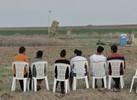
By Alex Shams
As the bombs have been falling on Gaza over the past four weeks, another war has been ongoing for the hearts and minds of the global public.
Although less deadly, this war of words offers a telling look into ongoing intellectual shifts in the Israeli and Zionist mainstream, revealing what experts argue is an increasingly violently racist and sexist Zionist worldview.
Diana Buttu, a Palestinian lawyer and a former member of the PLO negotiating team, told Ma'an that in the weeks since the Israeli assault began she has received a deluge of hundreds of hateful emails and violent threats. Although she is accustomed to hate mail, she said that the tone and quantity is "unprecedented."
"In the past I used to get messages calling me crazy or out of my mind, but now they're telling me things like 'kill all Muslim scum,' along with organized groups of Israelis who regularly send me emails swearing at me."
She said that every single one of the hundreds of emails she has gotten in the last few days have used either racist or sexist language -- including rape threats -- and a total of 0 expressed polite disagreement or substantive arguments.
Buttu told Ma'an in a Skype interview that she thinks the shift in language and the rise in sexualized violence as a metaphor for war is indicative of broader trends in the Israeli public.
"When you have a prime minister calling people who killed three Israeli settlers 'human animals' or you have (Knesset member) Ayelet Sheked who calls people 'snakes' to be 'exterminated' … It gets reflected in the level of comments and hate mail we receive."
Buttu argued that as Israeli government propaganda has increasingly painted the Palestinian cause as an "offshoot" of Boko Haram, ISIS, the Muslim Brotherhood, and "basically anything that is bad happening around the world," the idea that the Palestinian "struggle is a nationalist one and a struggle for freedom is completely gone."
The second trend Buttu noted in the hate mail was violent sexism, which she argued had become mainstream in Zionist discourse.
Buttu argued that a central irony of the discourse is in the explicitly sexist language used against pro-Palestinian figures, even as Zionists claim Israel to be a supposed "paradise" for women's rights.
She highlighted recent statements by Mordechai Kedar, an Israeli scholar of Arabic literature and a lecturer at the religious Bar-Ilan University, who said that the "only way" to deter Palestinian "terrorists" was threatening to rape their mothers and sisters. He made the statements as part of larger comparisons between Israel and "Arab societies," suggesting that sexual violence was the only language Arabs understood and thus suggesting Jewish soldiers needed to use it.
"Because they believe that women's rights are being protected and enhanced in Israel, it gives them permission to use this type of sexist violence language against women," Buttu said. "In the belief that because they are so liberal and fantastic, this is a considered part of discourse and women just need to learn how to accept it."
"It is completely different vitriol from before … Israeli hasbara has systematically over course of the past 6 years focused on dehumanizing Palestinians," she said.
"The hate we receive is a sheer reflection of what's going on in Israel."
Israeli discourse of sexualized violence rises amid Gaza assault Published today (updated) 06/08/2014 19:57 A woman wearing just an Israeli flag during a rally across from the
United Nations July 28, 2014 in New York. (AFP/Stan Honda) By Alex Shams
BETHLEHEM (Ma'an) -- As the bombs have been falling on Gaza over the past four weeks, another war has been ongoing for the hearts and minds of the global public.
Although less deadly, this war of words offers a telling look into ongoing intellectual shifts in the Israeli and Zionist mainstream, revealing what experts argue is an increasingly violently racist and sexist Zionist worldview.
Diana Buttu, a Palestinian lawyer and a former member of the PLO negotiating team, told Ma'an that in the weeks since the Israeli assault began she has received a deluge of hundreds of hateful emails and violent threats. Although she is accustomed to hate mail, she said that the tone and quantity is "unprecedented."
"In the past I used to get messages calling me crazy or out of my mind, but now they're telling me things like 'kill all Muslim scum,' along with organized groups of Israelis who regularly send me emails swearing at me."
She said that every single one of the hundreds of emails she has gotten in the last few days have used either racist or sexist language -- including rape threats -- and a total of 0 expressed polite disagreement or substantive arguments.
Buttu told Ma'an in a Skype interview that she thinks the shift in language and the rise in sexualized violence as a metaphor for war is indicative of broader trends in the Israeli public.
"When you have a prime minister calling people who killed three Israeli settlers 'human animals' or you have (Knesset member) Ayelet Sheked who calls people 'snakes' to be 'exterminated' … It gets reflected in the level of comments and hate mail we receive."
Buttu argued that as Israeli government propaganda has increasingly painted the Palestinian cause as an "offshoot" of Boko Haram, ISIS, the Muslim Brotherhood, and "basically anything that is bad happening around the world," the idea that the Palestinian "struggle is a nationalist one and a struggle for freedom is completely gone."
The second trend Buttu noted in the hate mail was violent sexism, which she argued had become mainstream in Zionist discourse.
Buttu argued that a central irony of the discourse is in the explicitly sexist language used against pro-Palestinian figures, even as Zionists claim Israel to be a supposed "paradise" for women's rights.
She highlighted recent statements by Mordechai Kedar, an Israeli scholar of Arabic literature and a lecturer at the religious Bar-Ilan University, who said that the "only way" to deter Palestinian "terrorists" was threatening to rape their mothers and sisters. He made the statements as part of larger comparisons between Israel and "Arab societies," suggesting that sexual violence was the only language Arabs understood and thus suggesting Jewish soldiers needed to use it.
"Because they believe that women's rights are being protected and enhanced in Israel, it gives them permission to use this type of sexist violence language against women," Buttu said. "In the belief that because they are so liberal and fantastic, this is a considered part of discourse and women just need to learn how to accept it."
"It is completely different vitriol from before … Israeli hasbara has systematically over course of the past 6 years focused on dehumanizing Palestinians," she said.
"The hate we receive is a sheer reflection of what's going on in Israel."
'Objectification of Palestinian bodies metaphor for brutality'
As the bombs have been falling on Gaza over the past four weeks, another war has been ongoing for the hearts and minds of the global public.
Although less deadly, this war of words offers a telling look into ongoing intellectual shifts in the Israeli and Zionist mainstream, revealing what experts argue is an increasingly violently racist and sexist Zionist worldview.
Diana Buttu, a Palestinian lawyer and a former member of the PLO negotiating team, told Ma'an that in the weeks since the Israeli assault began she has received a deluge of hundreds of hateful emails and violent threats. Although she is accustomed to hate mail, she said that the tone and quantity is "unprecedented."
"In the past I used to get messages calling me crazy or out of my mind, but now they're telling me things like 'kill all Muslim scum,' along with organized groups of Israelis who regularly send me emails swearing at me."
She said that every single one of the hundreds of emails she has gotten in the last few days have used either racist or sexist language -- including rape threats -- and a total of 0 expressed polite disagreement or substantive arguments.
Buttu told Ma'an in a Skype interview that she thinks the shift in language and the rise in sexualized violence as a metaphor for war is indicative of broader trends in the Israeli public.
"When you have a prime minister calling people who killed three Israeli settlers 'human animals' or you have (Knesset member) Ayelet Sheked who calls people 'snakes' to be 'exterminated' … It gets reflected in the level of comments and hate mail we receive."
Buttu argued that as Israeli government propaganda has increasingly painted the Palestinian cause as an "offshoot" of Boko Haram, ISIS, the Muslim Brotherhood, and "basically anything that is bad happening around the world," the idea that the Palestinian "struggle is a nationalist one and a struggle for freedom is completely gone."
The second trend Buttu noted in the hate mail was violent sexism, which she argued had become mainstream in Zionist discourse.
Buttu argued that a central irony of the discourse is in the explicitly sexist language used against pro-Palestinian figures, even as Zionists claim Israel to be a supposed "paradise" for women's rights.
She highlighted recent statements by Mordechai Kedar, an Israeli scholar of Arabic literature and a lecturer at the religious Bar-Ilan University, who said that the "only way" to deter Palestinian "terrorists" was threatening to rape their mothers and sisters. He made the statements as part of larger comparisons between Israel and "Arab societies," suggesting that sexual violence was the only language Arabs understood and thus suggesting Jewish soldiers needed to use it.
"Because they believe that women's rights are being protected and enhanced in Israel, it gives them permission to use this type of sexist violence language against women," Buttu said. "In the belief that because they are so liberal and fantastic, this is a considered part of discourse and women just need to learn how to accept it."
"It is completely different vitriol from before … Israeli hasbara has systematically over course of the past 6 years focused on dehumanizing Palestinians," she said.
"The hate we receive is a sheer reflection of what's going on in Israel."
Israeli discourse of sexualized violence rises amid Gaza assault Published today (updated) 06/08/2014 19:57 A woman wearing just an Israeli flag during a rally across from the
United Nations July 28, 2014 in New York. (AFP/Stan Honda) By Alex Shams
BETHLEHEM (Ma'an) -- As the bombs have been falling on Gaza over the past four weeks, another war has been ongoing for the hearts and minds of the global public.
Although less deadly, this war of words offers a telling look into ongoing intellectual shifts in the Israeli and Zionist mainstream, revealing what experts argue is an increasingly violently racist and sexist Zionist worldview.
Diana Buttu, a Palestinian lawyer and a former member of the PLO negotiating team, told Ma'an that in the weeks since the Israeli assault began she has received a deluge of hundreds of hateful emails and violent threats. Although she is accustomed to hate mail, she said that the tone and quantity is "unprecedented."
"In the past I used to get messages calling me crazy or out of my mind, but now they're telling me things like 'kill all Muslim scum,' along with organized groups of Israelis who regularly send me emails swearing at me."
She said that every single one of the hundreds of emails she has gotten in the last few days have used either racist or sexist language -- including rape threats -- and a total of 0 expressed polite disagreement or substantive arguments.
Buttu told Ma'an in a Skype interview that she thinks the shift in language and the rise in sexualized violence as a metaphor for war is indicative of broader trends in the Israeli public.
"When you have a prime minister calling people who killed three Israeli settlers 'human animals' or you have (Knesset member) Ayelet Sheked who calls people 'snakes' to be 'exterminated' … It gets reflected in the level of comments and hate mail we receive."
Buttu argued that as Israeli government propaganda has increasingly painted the Palestinian cause as an "offshoot" of Boko Haram, ISIS, the Muslim Brotherhood, and "basically anything that is bad happening around the world," the idea that the Palestinian "struggle is a nationalist one and a struggle for freedom is completely gone."
The second trend Buttu noted in the hate mail was violent sexism, which she argued had become mainstream in Zionist discourse.
Buttu argued that a central irony of the discourse is in the explicitly sexist language used against pro-Palestinian figures, even as Zionists claim Israel to be a supposed "paradise" for women's rights.
She highlighted recent statements by Mordechai Kedar, an Israeli scholar of Arabic literature and a lecturer at the religious Bar-Ilan University, who said that the "only way" to deter Palestinian "terrorists" was threatening to rape their mothers and sisters. He made the statements as part of larger comparisons between Israel and "Arab societies," suggesting that sexual violence was the only language Arabs understood and thus suggesting Jewish soldiers needed to use it.
"Because they believe that women's rights are being protected and enhanced in Israel, it gives them permission to use this type of sexist violence language against women," Buttu said. "In the belief that because they are so liberal and fantastic, this is a considered part of discourse and women just need to learn how to accept it."
"It is completely different vitriol from before … Israeli hasbara has systematically over course of the past 6 years focused on dehumanizing Palestinians," she said.
"The hate we receive is a sheer reflection of what's going on in Israel."
'Objectification of Palestinian bodies metaphor for brutality'

A woman wearing just an Israeli flag during a rally across from the United Nations July 28, 2014 in New York
Bill Maher@billmaher Dealing w/ Hamas is like dealing w/ a crazy woman who's trying to kill u - u can only hold her wrists so long before you have to slap her
Simona Sharoni, Chair of the Gender and Women's Studies Department at SUNY Plattsburgh and a specialist on on gender and militarization in Israel/Palestine, told Ma'an via email that in comparison to before, the images of gendered violence being deployed during the ongoing assault are "more extreme, cruder, and bordering on pornography."
"In the context of the Israeli assault on Gaza, Palestinian women are occupied and violated both as Palestinians and as women. It is clear that the objectification of Palestinian women's bodies is a metaphor for the brutality of this operation, the vulnerability of its victims and the lack of accountability for the perpetrators," she argued.
Although not new, "this horrific attack has legitimized the use of racist, homophobic and sexist threats against anyone who opposes it," she added, highlighting that in times of war such attacks gain wider legitimacy, even against Jewish Israelis who express opposition to the assault.
She also stressed that sexualized violence was "embedded in Israel's highly militarized culture," highlighting that the calling up of soldiers to engage in violence in the name of "national security" as well as their deaths in that cause had made the phenomenon more visible.
Sharoni pointed out that since Israeli soldiers had begun dying in the assault, a number of facebook groups had proliferated that featured Jewish Israeli women exposing themselves on social media to "support the troops." Women submitting photographs of part of their bodies with messages in support of the Israeli military to groups like "Standing with IDF", she told Ma'an, is a new phenomenon.
Bill Maher@billmaher Dealing w/ Hamas is like dealing w/ a crazy woman who's trying to kill u - u can only hold her wrists so long before you have to slap her
Simona Sharoni, Chair of the Gender and Women's Studies Department at SUNY Plattsburgh and a specialist on on gender and militarization in Israel/Palestine, told Ma'an via email that in comparison to before, the images of gendered violence being deployed during the ongoing assault are "more extreme, cruder, and bordering on pornography."
"In the context of the Israeli assault on Gaza, Palestinian women are occupied and violated both as Palestinians and as women. It is clear that the objectification of Palestinian women's bodies is a metaphor for the brutality of this operation, the vulnerability of its victims and the lack of accountability for the perpetrators," she argued.
Although not new, "this horrific attack has legitimized the use of racist, homophobic and sexist threats against anyone who opposes it," she added, highlighting that in times of war such attacks gain wider legitimacy, even against Jewish Israelis who express opposition to the assault.
She also stressed that sexualized violence was "embedded in Israel's highly militarized culture," highlighting that the calling up of soldiers to engage in violence in the name of "national security" as well as their deaths in that cause had made the phenomenon more visible.
Sharoni pointed out that since Israeli soldiers had begun dying in the assault, a number of facebook groups had proliferated that featured Jewish Israeli women exposing themselves on social media to "support the troops." Women submitting photographs of part of their bodies with messages in support of the Israeli military to groups like "Standing with IDF", she told Ma'an, is a new phenomenon.

"The fact that Israeli soldiers felt entitled to women's bodies, especially in times of war, is not a new phenomenon ... What is new is the fact that this entitlement is embraced publicly by women."
This public embracing of the discourse of sexualized violence appears to be related to the wider public support for the assault, as well as in the increasing deployment of the image of Israel as an "outpost of Western civilization" and women's rights that allows for a self-conscious embrace of liberalism combined with a simultaneous unleashing of intense violence against the Palestinian "other."
Although these trends have been an integral part of Zionist ideology since even before 1948, the post-9/11 intellectual atmosphere stressing a war between the West and Islam has markedly changed the framework, and many say it has unleashed a novel kind of hate that actively applauds a more brazenly racist and sexist worldview.
'Bibi, finish inside'
Youssef Munayyer, Executive Director of the Palestine Center in Washington D.C., told Ma'an in a telephone interview that over the last 10 years of working on Middle East-related issues, the trend toward sexual violence had become much more explicit.
Munayyer noted a cartoon that had been widely circulated on Israeli social media over the last month, showing a woman in niqab with the word "Gaza" written on her laying on a bed with the caption: "Bibi, finish inside this time! Signed, citizens in favor of ground assault."
This public embracing of the discourse of sexualized violence appears to be related to the wider public support for the assault, as well as in the increasing deployment of the image of Israel as an "outpost of Western civilization" and women's rights that allows for a self-conscious embrace of liberalism combined with a simultaneous unleashing of intense violence against the Palestinian "other."
Although these trends have been an integral part of Zionist ideology since even before 1948, the post-9/11 intellectual atmosphere stressing a war between the West and Islam has markedly changed the framework, and many say it has unleashed a novel kind of hate that actively applauds a more brazenly racist and sexist worldview.
'Bibi, finish inside'
Youssef Munayyer, Executive Director of the Palestine Center in Washington D.C., told Ma'an in a telephone interview that over the last 10 years of working on Middle East-related issues, the trend toward sexual violence had become much more explicit.
Munayyer noted a cartoon that had been widely circulated on Israeli social media over the last month, showing a woman in niqab with the word "Gaza" written on her laying on a bed with the caption: "Bibi, finish inside this time! Signed, citizens in favor of ground assault."
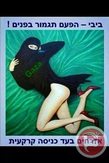
"There has been a more explicit shift that not only likens the situation to rape, but also accepts those power dynamics and applauds them," he added. "This is a level of evil we have not seen before."
"The roots are deep," he said, "but it's at the surface now, and it's noticeable in a way that it wasn't before. It's really disturbing."
"At the same time that they talk about being defenders of women's rights, the kind of language used toward Palestinian women and Palestinian people more broadly has very little concern for women at all."
Munayyer linked the shift in increasingly sexually violent rhetoric to wider trends in racism in Israeli society, highlighting the increasing "nativism" that has targeted and dehumanized not only Palestinians but also African migrants. He argued that evidence of the shift was also visible in campaigns in Israeli society to "protect Jewish women from Arab men," such as the notorious anti-miscegenation group Lehava that patrols public spaces to prevent racial mixing.
"The roots are deep," he said, "but it's at the surface now, and it's noticeable in a way that it wasn't before. It's really disturbing."
"At the same time that they talk about being defenders of women's rights, the kind of language used toward Palestinian women and Palestinian people more broadly has very little concern for women at all."
Munayyer linked the shift in increasingly sexually violent rhetoric to wider trends in racism in Israeli society, highlighting the increasing "nativism" that has targeted and dehumanized not only Palestinians but also African migrants. He argued that evidence of the shift was also visible in campaigns in Israeli society to "protect Jewish women from Arab men," such as the notorious anti-miscegenation group Lehava that patrols public spaces to prevent racial mixing.

Lehava sticker in Jerusalem warning Arabs not to "think about touching" Jewish women
"It's not just about protecting Jewish women, it's about protecting the tribe as well as the constant battle for demographics that is at foundation of the state … and the worry about how many Palestinian and Jewish babies are being born."
"When you talk about human beings as an existential threat, it legitimizes everything you could do to them -- racism, sexual violence, and so on."
"It's not just about protecting Jewish women, it's about protecting the tribe as well as the constant battle for demographics that is at foundation of the state … and the worry about how many Palestinian and Jewish babies are being born."
"When you talk about human beings as an existential threat, it legitimizes everything you could do to them -- racism, sexual violence, and so on."
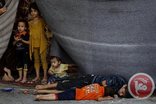
A delegation of Arab foreign ministers, including those of Egypt and Jordan, will visit Gaza "soon" in a show of support for Palestinians, Arab League chief Nabil al-Arabi said Wednesday.
The ministers will also assess reconstruction needs in the battered enclave after a nearly month-long war between Israel and Hamas, Arabi said.
"An Arab ministerial delegation will go to Gaza soon in solidarity," he told reporters.
The delegation, which is expected to expand, so far includes the foreign ministers of Egypt, Kuwait, Jordan and Morocco, as well as Arabi himself.
A 72-hour ceasefire took hold on Tuesday in the conflict, which is expected to cost the territory up to $6 billion (4.5 billion euros) in damage, said Palestinian deputy economy minister Taysir Amro in Ramallah.
A more precise assessment would be carried out once calm returns permanently to the overpopulated sliver of territory where more than 1,850 people were killed and nearly half a million displaced, he said.
The ministers will also assess reconstruction needs in the battered enclave after a nearly month-long war between Israel and Hamas, Arabi said.
"An Arab ministerial delegation will go to Gaza soon in solidarity," he told reporters.
The delegation, which is expected to expand, so far includes the foreign ministers of Egypt, Kuwait, Jordan and Morocco, as well as Arabi himself.
A 72-hour ceasefire took hold on Tuesday in the conflict, which is expected to cost the territory up to $6 billion (4.5 billion euros) in damage, said Palestinian deputy economy minister Taysir Amro in Ramallah.
A more precise assessment would be carried out once calm returns permanently to the overpopulated sliver of territory where more than 1,850 people were killed and nearly half a million displaced, he said.

Israeli forces opened fire at Gaza municipality staff while they were inspecting a destroyed park east of Shujaiyya, the workers said on Wednesday.
The attack came on the second day of a 72-hour ceasefire between Israel and Palestinian militants and took place in the al-Qubba area of the neighborhood, which witnessed some of the most intensive Israeli bombardment over the course of the four-week Israeli assault.
An official from the Gaza municipality told Ma'an that "Israeli forces opened fire early Wednesday at the municipality staff that was checking the park of al-Qubba in eastern al-Shujaiyya," adding that no injuries were reported.
"They survived the gunfire by a miracle," the official added.
An Israeli military spokeswoman confirmed the incident, saying that after Palestinians "approached the (security) fence, soldiers opened fire into the air, and they retreated."
The attack came on the second day of a 72-hour ceasefire between Israel and Palestinian militants and took place in the al-Qubba area of the neighborhood, which witnessed some of the most intensive Israeli bombardment over the course of the four-week Israeli assault.
An official from the Gaza municipality told Ma'an that "Israeli forces opened fire early Wednesday at the municipality staff that was checking the park of al-Qubba in eastern al-Shujaiyya," adding that no injuries were reported.
"They survived the gunfire by a miracle," the official added.
An Israeli military spokeswoman confirmed the incident, saying that after Palestinians "approached the (security) fence, soldiers opened fire into the air, and they retreated."
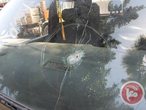
The Gaza municipality workers told Ma'an that $40,000 worth of damage had been caused in the park due to Israeli airstrikes and attacks over the last month.
Israel permanently maintains a "security buffer zone" that extends between 500 meters and 1500 meters into the Strip, encompassing around 17 percent of Gaza's total land area and 35 percent of its agricultural land and the lives and livelihoods of more than 100,000 Gazans.
Since Israel launched a massive assault on Gaza four weeks ago, the buffer zone has been extended into Gaza to cover around 44 percent of the entire land area.
Israel permanently maintains a "security buffer zone" that extends between 500 meters and 1500 meters into the Strip, encompassing around 17 percent of Gaza's total land area and 35 percent of its agricultural land and the lives and livelihoods of more than 100,000 Gazans.
Since Israel launched a massive assault on Gaza four weeks ago, the buffer zone has been extended into Gaza to cover around 44 percent of the entire land area.

The Ministry of Prisoner Affairs said Wednesday that it has not received information about Palestinians detained in Gaza during Israel's offensive.
"The occupation army, during its current aggression on the Gaza Strip, has detained dozens of Palestinians and taken them to unknown locations," Minister of Prisoner's Affairs Shawqi al-Ayasa said in a statement.
Al-Ayasa said the ministry was yet to receive crucial information about the prisoners' ID numbers, locations, and conditions.
The fact that Israel has withheld the information is worrying, al-Ayasa said, adding that there were "growing fears that some of the prisoners have been executed."
He called on international organizations, specifically the International Committee of the Red Cross, to intercede to obtain the information on the ministry's behalf.
Al-Ayasa also requested that families in Gaza who suspect their relatives have been detained contact the Ministry of Prisoner Affairs.
The ministry said in a statement Sunday that more than 200 Palestinians had been detained in Gaza while Israeli forces were on the ground, but that some of them had been released.
A spokesman for the Israeli Prison Service told Ma'an that she did not have any information about the number of prisoners being held in Israel after being detained from Gaza during the offensive.
"The occupation army, during its current aggression on the Gaza Strip, has detained dozens of Palestinians and taken them to unknown locations," Minister of Prisoner's Affairs Shawqi al-Ayasa said in a statement.
Al-Ayasa said the ministry was yet to receive crucial information about the prisoners' ID numbers, locations, and conditions.
The fact that Israel has withheld the information is worrying, al-Ayasa said, adding that there were "growing fears that some of the prisoners have been executed."
He called on international organizations, specifically the International Committee of the Red Cross, to intercede to obtain the information on the ministry's behalf.
Al-Ayasa also requested that families in Gaza who suspect their relatives have been detained contact the Ministry of Prisoner Affairs.
The ministry said in a statement Sunday that more than 200 Palestinians had been detained in Gaza while Israeli forces were on the ground, but that some of them had been released.
A spokesman for the Israeli Prison Service told Ma'an that she did not have any information about the number of prisoners being held in Israel after being detained from Gaza during the offensive.
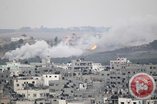
Hamas' delegation to Cairo has not received an official response to the demands the delegation submitted to Israel via Egyptian mediators, an official said Tuesday.
Israeli media reported earlier Tuesday that Egypt had told Hamas that demands such as building a seaport and airport, in addition to the opening of the Rafah crossing, were not up for discussion.
But Hamas official Izzat al-Rishiq told Ma'an TV that "what is being said about some of the demands being rejected" is not true.
Al-Rishiq said Hamas would continue insisting on an end to Israel's siege on Gaza, the release of Shalit-deal prisoners whom Israel has re-arrested, the building a seaport and an airport in Gaza, and the creation of a safe passage between the West Bank and the Gaza Strip.
"These are the demands the Palestinian people as a whole, and every single letter in the demands has been baptized by virtuous Palestinian blood, and the people of the Gaza Strip have already paid the price in destruction of hundreds of houses and mosques."
Al-Rishiq warned against any attempts by Israel to shrug off the demands, saying: "Resistance fighters have their hands on the trigger."
Israeli and Palestinian negotiators are in Cairo in an effort to secure a lasting truce between Israel and militant groups in Gaza.
Israeli media reported earlier Tuesday that Egypt had told Hamas that demands such as building a seaport and airport, in addition to the opening of the Rafah crossing, were not up for discussion.
But Hamas official Izzat al-Rishiq told Ma'an TV that "what is being said about some of the demands being rejected" is not true.
Al-Rishiq said Hamas would continue insisting on an end to Israel's siege on Gaza, the release of Shalit-deal prisoners whom Israel has re-arrested, the building a seaport and an airport in Gaza, and the creation of a safe passage between the West Bank and the Gaza Strip.
"These are the demands the Palestinian people as a whole, and every single letter in the demands has been baptized by virtuous Palestinian blood, and the people of the Gaza Strip have already paid the price in destruction of hundreds of houses and mosques."
Al-Rishiq warned against any attempts by Israel to shrug off the demands, saying: "Resistance fighters have their hands on the trigger."
Israeli and Palestinian negotiators are in Cairo in an effort to secure a lasting truce between Israel and militant groups in Gaza.
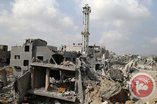
At least 134 factories were destroyed during Israel's four-week military offensive in the Gaza Strip, a Palestinian industrial union said Wednesday, causing severe damage to an already fragile industrial sector.
The union of Palestinian industries said that most factories stopped operations for over 30 days, with reported losses of at least $70 million.
Over 30,000 workers were made redundant due to the closures.
"The Israeli war machine deliberately destroyed the infrastructure of the Palestinian national economy by targeting factories which posed no security threat to the occupation," the union said.
The industrial sector had already suffered major damage during previous Israeli military offenses in Gaza in 2012 and 2008.
The ongoing Israeli blockade has also severely limited the productivity of the industrial sector since it was imposed eight years ago, forcing factories to close or fire workers to remain in operation.
"Israel shouldn't be rewarded for this aggression, and so Israeli products should be boycotted both locally and internationally," the union added.
Deputy PA economy minister Taysir Amro said the 29-day war had caused total damage of up to $6 billion dollars.
The union of Palestinian industries said that most factories stopped operations for over 30 days, with reported losses of at least $70 million.
Over 30,000 workers were made redundant due to the closures.
"The Israeli war machine deliberately destroyed the infrastructure of the Palestinian national economy by targeting factories which posed no security threat to the occupation," the union said.
The industrial sector had already suffered major damage during previous Israeli military offenses in Gaza in 2012 and 2008.
The ongoing Israeli blockade has also severely limited the productivity of the industrial sector since it was imposed eight years ago, forcing factories to close or fire workers to remain in operation.
"Israel shouldn't be rewarded for this aggression, and so Israeli products should be boycotted both locally and internationally," the union added.
Deputy PA economy minister Taysir Amro said the 29-day war had caused total damage of up to $6 billion dollars.

A delegation of doctors from the West Bank is traveling to Gaza to assist in treating patients who sustained wounds throughout Israel's offensive, the Ministry of Health said Wednesday.
The ministry said in a statement that 11 doctors specialized in surgery, plastic surgery, and anesthesia were headed to Gaza.
The delegation also consists of 10 nurses specializing in intensive care and surgery, the statement said.
According to the ministry, the group was the second delegation of doctors to head to Gaza from the West Bank since the beginning of Israel's offensive. Last Friday, 25 specialized doctors traveled to Gaza to assist in its hospitals.
The United Nations warned Saturday that after 27 days of Israeli assault, the Gaza public health system was "on the verge of collapse" as the numbers of dead and injured overwhelmed hospitals and clinics across the besieged coastal enclave.
"Hospitals are increasingly forced to discharge patients prematurely, to accommodate newer and most urgent cases, even though these patients often do not have any place to go to, let alone an adequate one," the UN Office for the Coordination of Humanitarian Affairs report said.
The Israeli assault on Gaza has left over 9,500 Palestinians injured, according to Gaza's health ministry.
The ministry said in a statement that 11 doctors specialized in surgery, plastic surgery, and anesthesia were headed to Gaza.
The delegation also consists of 10 nurses specializing in intensive care and surgery, the statement said.
According to the ministry, the group was the second delegation of doctors to head to Gaza from the West Bank since the beginning of Israel's offensive. Last Friday, 25 specialized doctors traveled to Gaza to assist in its hospitals.
The United Nations warned Saturday that after 27 days of Israeli assault, the Gaza public health system was "on the verge of collapse" as the numbers of dead and injured overwhelmed hospitals and clinics across the besieged coastal enclave.
"Hospitals are increasingly forced to discharge patients prematurely, to accommodate newer and most urgent cases, even though these patients often do not have any place to go to, let alone an adequate one," the UN Office for the Coordination of Humanitarian Affairs report said.
The Israeli assault on Gaza has left over 9,500 Palestinians injured, according to Gaza's health ministry.
Page: 96 - 95 - 94 - 93 - 92 - 91 - 90 - 89 - 88 - 87 - 86 - 85- 84 - 83 - 82 - 81 - 80 - 79 - 78 - 77
Truce violations List of names Pictures of martyrs
Days: Aug: 26 - 25 - 24 - 23 - 22 - 21 - 20 - 19 - 18 - 17 - 16 - 15 - 14 - 13 - 12 - 11 - 10 - 9 - 8 - 7 - 6 - 5 - 4 - 3 - 2 - 1
July: 31 - 30 - 29 - 28 - 27 - 26 - 25 - 24 - 23 - 22 - 21 - 20 - 19 - 18 - 17 - 16 - 15 - 14 - 13 - 12 - 11 - 10 - 9 - 8
Days: Aug: 26 - 25 - 24 - 23 - 22 - 21 - 20 - 19 - 18 - 17 - 16 - 15 - 14 - 13 - 12 - 11 - 10 - 9 - 8 - 7 - 6 - 5 - 4 - 3 - 2 - 1
July: 31 - 30 - 29 - 28 - 27 - 26 - 25 - 24 - 23 - 22 - 21 - 20 - 19 - 18 - 17 - 16 - 15 - 14 - 13 - 12 - 11 - 10 - 9 - 8
